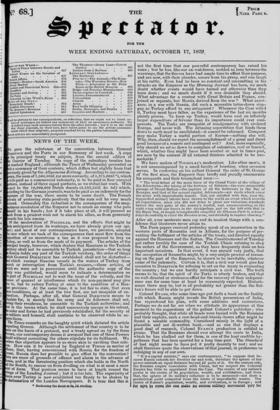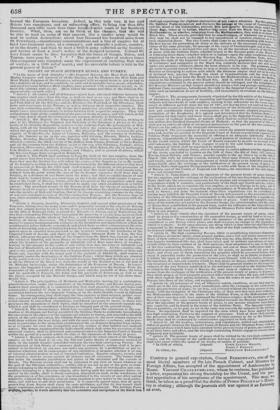9 E gave the substance of the convention between General
NEWSOF THE WEEK.
BBITSCH and the Porte in our Summary of last week. A copy the principal treaty we subjoin, from the second edition of Courier of Tuesday. No copy of the subsidiary treaties has reached England ; although the Times of Wednesday presented us
h a summary of their contents, which differs but slightly from that
viously given by the Allgemeine Zeitung. According to our contem-
ray, the sum of 1,500,000/. (or more correctly, of 1,375,000/.), which Lobe paid as a commercial indemnity, is to be paid in four unequal
IL rtions, instead of three equal portions, as we stated last week. With spect to the 10,000,000 Dutch ducats (4,583,333/. 6s. 8d.) which,
St rding to the German journals, was to be paid as an indemnity for th e
4 penses of the war, there seems to be some doubt. The French vats of yesterday state positively that the sum will be very much aced. Ostensibly this reduction is the consequence of the mag- nums resolution of the Emperor not to crush an enemy who puts
e. self in his hands ; but if it take place at all, it will proceed as teli from a prudent wish not to alarm his allies, as from generosity to awards his late enemy.
to Of the moderation of NICHOLAS, and the effects that might be dy anticipated from its workings, we have already given our °pi-
to a; and most of our contemporaries have, we perceive, adopted to e view which we took of the consequences that must flow from the
to position of so monstrous a tax as it was proposed to levy on 7, urkey, as well as from the mode of its payment. The articles of the eipal treaty, however, which declare that Russians in the Turkish erritory shall not be amenable to Turkish jurisdiction—that so long Russia holds any part of the Turkish territory, the order of things hieh General DIEBITSCH has established shall not be disturbed—
d which exempt Russian vessels in the waters of Turkey from earth or interruption from Turkish cruisers,—these articles, of ich we were not in possession until the authentic copy of the aty was published, would seem to indicate a determination on
e part of NICHOLAS not to wait the issue of the subsidy, and the uses of quarrel or interference which its non-payment may give e to, but to reduce Turkey at once to the condition of a Rus- Or. an province. At the same time, it is but fair to state, that even 10 se conditions, or at least the two first, are' not incapable of ex- y anation. Perhaps, after all, what General DIEBITSCH means to E. palate for, is merely that his army and its followers shall not, uring their residence, be amenable to the Turkish authorities ; and id at in the towns which he shall successively occupy in his retreat, order and forms he had previously established, for the security of lie S soldiers and himself, shall continue to be observed while he oc- he pies them.
The Times remarks on the haughty spirit which dictated the article peeling Greece. Although the settlement of that country is to be ade on the basis of a protocol, and a treaty agreed on by the three
- ewers, our contemporary deems it arrogant that one of these Powers
auld without consulting the others stipulate for its fulfilment. We he nfess this objection appears to us more akin to cavilling than criti- rn. How can it be received by England or France as matter of 0 fence, that, having conventioned with Russia for the freedom of eeee, Russia does her possible to give effect to the convention? • e are enow of grounds of offence and alarm in the advance of avia, and in the threatening position which she holds in the North ti the South, to excuse us from dwelling on what is at most a mere 'tit of form. That position seems to have at length roused the lin▪ gs of the Leading Journal • but it is too late. The superiority of
sia over Turkey is now established too firmly to be shaken by t, declamation of the London Newspapers. It is true that this is Reckenieg the 4sct t ei, eteding,
not the first time that our powerful contemporary has raised his voice ; but he has, like our ex-watchmen, nodded so long between the warnings, that the thieves have had ample time to effect their purpose, and are now, with their plunder, secure from his grasp, and can lausrli at his rattle. Even had lie been as constant and unremitting in his • attacks on the Emperor as the Morning Journal has been, we much doubt whether events would have turned out otherwise than they have done ; and we much doubt if it was desirable they should. What advantage for a contest with Great Britain and France, con- joined or separate; has Russia derived from the war ? What assist- ance, in a war with Russia, did such a miserable totter-down stop- gap as Turkey afford to any antagonist ? Whenever the Czar willed it, Turkey must have fallen, as the experience of the last six months plainly proves. To keep up Turkey, would have cost an infinitely will be obvious to our correspondents, on reflection, that we ought not to insert no- largrer expenditure of fervour than its importance could ever com- fit:es of marriages (or indeed any statements of fart) on anonymous authority. We do indeed copy such announcements from the other journals ; but it is on the faith pensate. The Turks are incapable of amalgamating with civilized that those journals, in their turn, have taken pains to see the private announce- Europe, and never will. The debasing superstition that binds them meats which they originate, properlyvouched for by the parties interested. down to earth must be annihilated—it cannot be reformed. Conquest ereral articles are unavoidably postponed.
may make Turkey a useful portion of Europe—nothing else will. Why, then, should we regret the accomplishment of a great and direct good because of a remote and contingent evil ? And, more especially, why should we set us down to complain of calamities, real or fancied, which, whether they might have been averted or not in times past, are now by the consent 6f all rational thinkers admitted to be irre- mediable ?
We have spoken of NICHOLAS'S moderation: Like other men's, it is not unaccompanied by a small faculty of boasting, when occasion serves. In conferring on his gallant General the order of St. George of the first class, the Emperor thus briefly and proudly enumerates his conquests and their triumphant issue:— " The total defeat of the main force of the Grand Vizier at the village of Ku-Klewtscha—the taking of the fortress of Silistria—the ever-memorable passage of Mount Balkan—the capture of all the fortresses in the Bay of Bourgas, and that of the second capital, Adrianople—are deeds which cover the army with imperishable laurels. But, not satisfied with this, your dis- tinguished military talents have shown to the world an event which exceeds all expectation, since you did not delay to plant our victorious standards before the very gates of the enemy's capital, and, communicating on the right win.. with our forces in the Archipelago, and on the left with that in the Black Sea, at length triumphantly conzpelled the Ottoman Porte to achnow - ledge its inability to resist the Russian arms, and decidedly to implore clemency."
After all, your moderate men say and do insolent things with a con- fidence that blusterers never attain to.
The Paris papers received yesterday speak of an insurrection in the western parts of Roumelia and in -Albania, for the purpose of pre- venting the fulfilment of the articles of the treaty, and directed equally against the Russians and the Sultan. The Constitutionnel of Tuesday put rather forcibly the case of the Turkish Chiefs refusing to obey the orders of the Government, as they have frequently done on less important occasions. In that event, it was argued very justly, that the occupation of Roumelia might, by a very simple process of reason- ing on the part of the Emperor, be shown to be inevitable, whatever came of the indemnity. Certain it is, that a civil war would give fair occasion to DIEBITSCH for refusing to act on the treaty in evacuating the country ; but we can hardly anticipate a civil war. The truth seems to be, that the spirit of the Turks is utterly broken, and that no well-directed or strenuous effect for the recovery of their independ- ence can for some time at least be reasonably expected. Disturb- ances there may be, but in all probability not greater than the Sul- tan's forces will be able to put down.
Colonel EVANS, who some time ago put forth a book on the facility with which Russia might invade the British possessions of India, has reproduced his plan, with some additions and corrections. Perhaps we do not far err when we attribute its appearance at this moment to the suggestions of the gallant Colonel's publisher ; who probably thought, that while all heads were busied with the Russians and their exploits, such a raw-head-and-bloody-bones affair might be found a saleable commodity. Considered merely in the light of a plausible and not ill-written hook,—and as one that displays a good deal of research, Colonel EVANS'S production is entitled to praise. That the Russians should ever attempt the route to India, which he has chalked out for them, is one of the least credible hy- potheses that has been sported for a long time past. The Standard of last night seems to have put it pretty decently to rest; and we shall therefore quote the observations of that journal, in preference to indulging in any of our own.
" It is a capital mistake," says our contemporary, "to suppose that be- cause Russia extends her frontier far and wide, therefore the sphere of her power extends an equal distance beyond all parts of it. On the eastern side, the Russian empire inosculates with China, but we suspect the Celestial Empire has little to apprehend from the Czar. The centre of any nation's power is the centre of its population, wealth, and civilization ; and from that, the sphere of its military influence is to be measured—not from a geometrical point computed from the limits of unprofitable wastes. The centre of Russia's population, wealth, and civilization, is in Europe ; and OF. Meg P? FYLnq Ole C44 3A4.4 i eligu4mUitry incnr.eniqt Yen' fa
beyond the European boundary. Indeed, n this wry war,. it has cost Russia two campaigns, and an exbausting effort, tb bring less than fifty thousand men little more than three hundred miles south of her Southern frontier. What, then, are we to think of the chances, that she will be able to send an army of that amount, (for a smaller army would be sent to certain destruction) about four thousand five hundred miles from St. Petersburg,—maintaining communications and a line of supplies for at least two thousand miles, in a stranger's, and naturally a jealous, country, or in the desert - and then to meet a British army collected on the frontier, and having at least a year's notice of the designed invasion. Colonel De Lacy Evans seems to have forgotten that the times of Gengis, Raton, and Timour, have gone by. * * The greatest soldier of modern times (his conqueror only excepted) made the experiment of imitating that style of warfare, in a 1500 miles' march ; and his miserable failure is told in the present power of Russia."



















